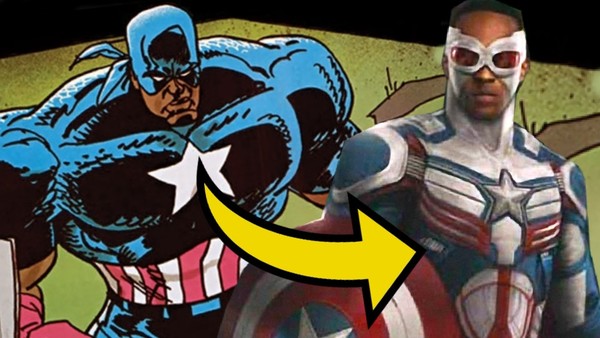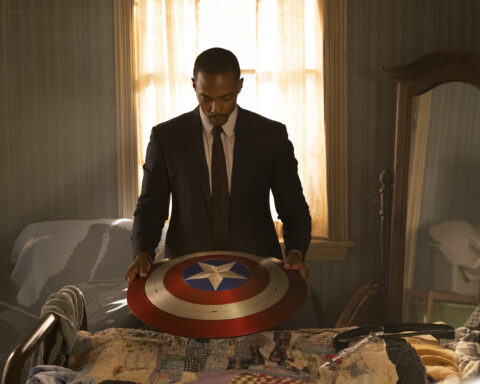Note: This op-ed contains spoliers for ‘The Falcon and the Winter Soldier.’
As a lifelong comic book fan, I see a Black Captain America as a long-overdue revolution in popular culture — one that recognizes, rather than runs away from, the centrality of the struggle for racial justice to the larger American project.
“The Falcon and the Winter Soldier,” the six-part Disney series that culminates [spoiler alert] in Anthony Mackie’s Sam Wilson becoming a Black Captain America, is important because it challenges notions of American exceptionalism that gloss over the most painful chapters in our nation’s history. It also underscores the need to understand contemporary political crises as rooted in an origin story Americans have often stubbornly refused to acknowledge.
For me, loving superheroes and loving history have always been linked. When I was young, my comic book fandom paralleled and intersected with my deepening love of writing, of reading fiction and of understanding Black history. As a budding intellectual, my fandom shaped my study of that history; for me, the most interesting comic books were the ones that reimagined the world of superheroes, parallel universes and intergalactic struggle — and presented them as being inclusive of the Black experience.
Those stories weren’t always the same ones featured at the multiplex. The first decade of the Marvel Cinematic Universe (MCU) began with the 2008 release of “Iron Man,” a blockbuster movie adaptation that made Robert Downey Jr. a box office star and launched a multi-billion-dollar global cinematic franchise. Marvel heroes, in contrast to rival comic book universes, were the ones who lived just outside your door, with real problems that allowed readers (and later filmgoers) to relate to the teenage angst of Peter Parker’s Spiderman or the battle with alcohol addiction fought by Tony Stark’s Iron Man (in the comics, but not film).
However, until the February 2018 release of “Black Panther,” the MCU looked mostly White. “Black Panther,” with an overwhelmingly Black cast, brought a vision of Afro-futurism into mainstream American popular culture, which often falters when confronting the more complex and painful aspects of Black history. The move to diversify the superhero canon on screen — along with “Black Panther,” the Black female “Ironheart” introduced in 2016 — has been emotionally thrilling, but also, to my disappointment, controversial.
Enter Captain America. First introduced in 1941, Captain America — dressed proudly in red, white and blue and sporting a virtually indestructible shield — proved a popular wartime comic book, and one that was reintroduced in 1964. The character, who derived his super-strength from a serum invented by American scientists to help end the Second World War, took on additional layers of mournful complexity as portrayed by actor Chris Evans in three movies in the 2010s that established him as a fish out of water. Frozen for seven decades while combating the forces of Nazi fascists and Hydra (a comic book invention) terrorists, Rogers awakens in the 21st century to a world that has left him, as well as much of the values he fought the war for, behind.
Captain America is arguably the most iconic comic book character of postwar American history. Blond, blue-eyed, and square-jawed, his alter ego Steve Rogers was an everyman whose heroic exploits as Captain America never acknowledged the domestic racial horrors that existed at home while Captain America battled Nazis and the Red Skull overseas.
“The Falcon and the Winter Soldier” [spoiler alert] acknowledges this history by chronicling Black US Airforce pararescue airman Sam Wilson’s life starting six months after Steve Rogers hands Wilson the mantle of Captain America in “Avengers: Endgame.” The viewer sees Wilson’s efforts to serve and honor his country while being acutely aware of its shortcomings with respect to racial justice.
On the surface, “The Falcon and the Winter Soldier” is a rollicking action-adventure, interracial buddy comic book series echoing films that might make Generation Xers smile or wince with recognition: “48 Hours,” “Lethal Weapon,” “Trading Places” come to mind. In actuality, the series deftly explores the impact of systemic racism in a world not unlike our own.
Led by Black showrunner Malcolm Spellman, the series shows Wilson’s initial decision to reject Captain America’s shield as based on not just feelings of humility but also well-founded fears that much of the nation would never accept a Black man as Captain America, the embodiment of American patriotism and power. As Sam Wilson’s journey into becoming Captain America unfolds, the show alludes movingly to the personal and political experiences of African Americans who have contributed so much to their nation’s prosperity and identity while being stubbornly denied recognition for these very achievements.
Wilson’s discovery of Isaiah Bradley, a Black man injected with the Super Soldier serum alongside hundreds of African American soldiers who had been unwittingly exploited, sends him on a rough road toward reconciling his love of country with the brutal fact that America has never loved him, or Black soldiers and citizens, back. Sebastian Stan’s Bucky Barnes, Wilson’s White comrade, is revelatory in his willingness to listen, learn and try to comprehend the experiences of Black soldiers who loved the American flag as much as he does, but encountered a far different set of experiences they are still coming to terms with.
In a very real sense, their relationship mirrors the racial politics of our contemporary moment, with Barnes’ growing consciousness of how Wilson’s initial refusal to accept Captain America’s shield connects to a larger national history of systemic racism that he remained barely aware of until now. The series effectively honors the generations of Black soldiers who served valiantly, since the nation’s founding, in every single war America has ever fought, only to be humiliated, shunned and sometimes physically assaulted for wearing the uniform back home.
In the final episode, Sam Wilson recognizes himself as worthy of wielding Captain America’s shield — representing a flawed nation that he nonetheless loves with all his heart and soul. Wilson’s Black Captain America openly questions notions of American exceptionalism and boldly criticizes White supremacy in a bravura speech to political and governmental officials who are quick to praise his heroism but less eager to confront systemic racism and inequality. Anthony Mackie’s nuanced portrayal of Wilson’s inner turmoil, natural charisma and personal dignity reminded me of what might have happened if Sidney Poitier ever portrayed a comic book hero.
By the closing credits, when the series title “The Falcon and the Winter Soldier” transforms into “Captain America and the Winter Soldier,” we have a better sense of the magic trick that has taken place. By making the new Captain America into a Black soldier with a profound commitment to duty, family and country, the series forces us to reimagine the contours of Black identity. I found myself rooting for Wilson’s infectious optimism in American democracy even as I understood Bradley’s profound hurt and disappointment over the historic treatment of Black soldiers. As both a scholar of Black history and a lover of superheroes, I see Sam Wilson as the perfect embodiment of a Captain America for our current age.


